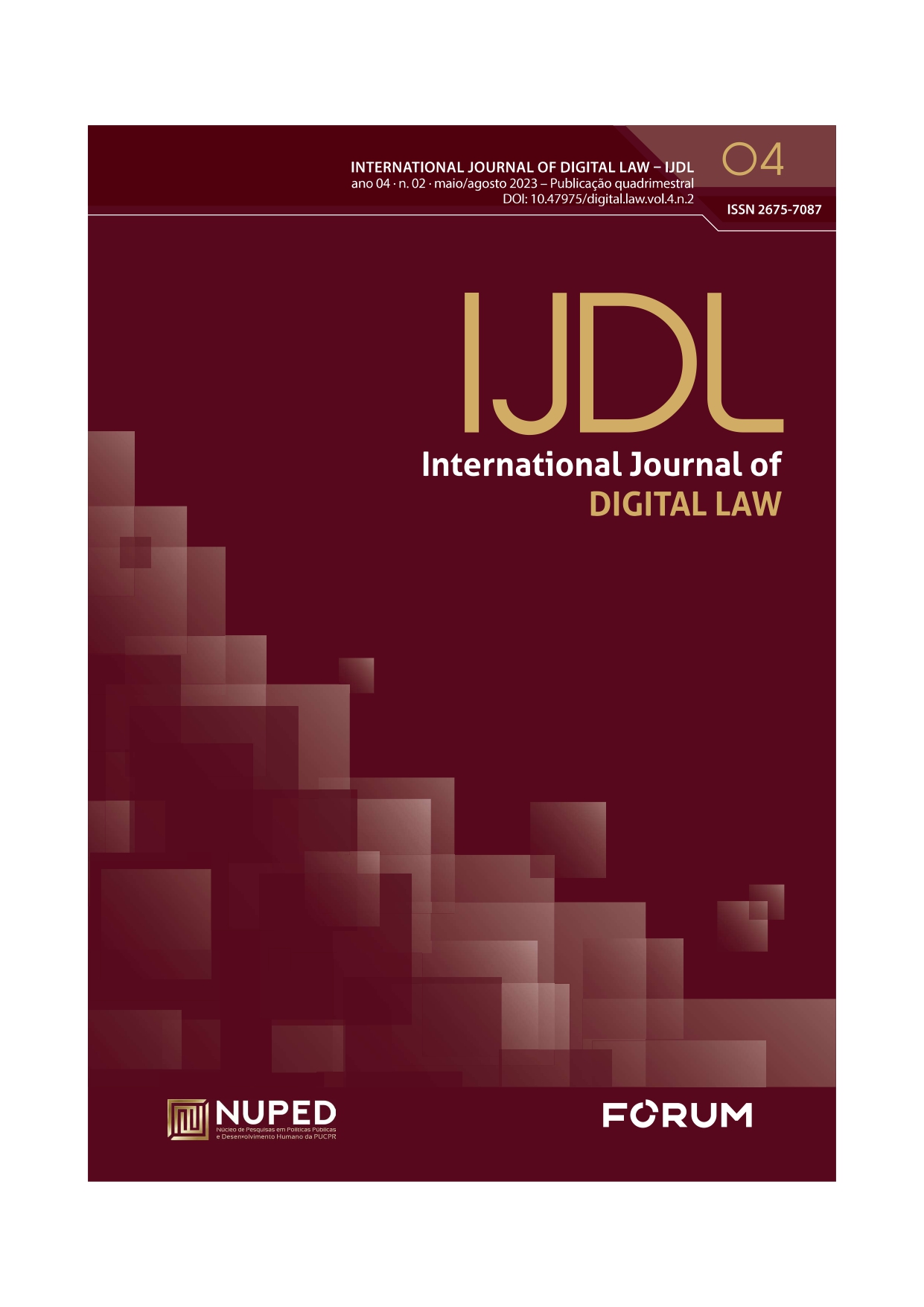Mapeamento das normas brasileiras sobre a Inteligência Artificial aplicada ao Direito: uma análise à luz dos direitos fundamentais
Mapping Brazilian rules on Artificial Intelligence applied to Law: an analysis in the context of fundamental rights
DOI:
https://doi.org/10.47975/digital.law.vol.4.n.2.gomesKeywords:
ARTIFICIAL INTELLIGENCE;, LAW;, LEGAL REGULATION;, MAPPING;, FUNDAMENTAL RIGHTS.Abstract
With the growing application of Artificial Intelligence (AI) in Law, this article aims to map the current and pending rules in Brazil related to the application of artificial intelligence in the legal field and investigate how such rules are aligned with fundamental rights. Although artificial intelligence can bring advances to the Law, it also presents risks: issues such as privacy, transparency, digital exclusion and the guarantee of non-discrimination were identified as sensitive points. The study reveals that Brazil has a normative framework under development to regulate the application of artificial intelligence in Law. However, it is essential that these rules are constantly reviewed and updated, in order to guarantee the protection and safeguard of rights. Still, there is a need for an approach that aims to ensure that artificial intelligence is used ethically and responsibly by legal practitioners.
KEYWORDS: ARTIFICIAL INTELLIGENCE; LAW; LEGAL REGULATION; MAPPING; FUNDAMENTAL RIGHTS.Downloads
References
ALETRAS, N. et al. Predicting judicial decisions of the European Court of Human Rights: a natural language processing perspective. PeerJ Computer Science, v. 2, e 93, 2016. DOI: https://doi.org/10.7717/peerj-cs.93
ALEXY, Robert. Teoria dos direitos fundamentais. São Paulo: Malheiros, 2008.
ALVES, Juliana Fernandes. Possíveis contribuições da accountability, para a regulação do uso de inteligência artificial pelo Poder Judiciário Brasileiro frente à necessidade de estabelecer padrões éticos para essa tecnologia, no Brasil. 2020. 90 f. Monografia – Curso de Direito, Universidade do Sul de Santa Catarina, Tubarão, 2020. Disponível em: https://repositorio.animaeducacao.com.br/handle/ANIMA/15554. Acesso em: 10 jun. 2023.
ASIMOV, Isaac. Histórias de robôs. L&PM Editora, Porto Alegre: 2019.
AUTORIDADE NACIONAL DE PROTEÇÃO DE DADOS – ANPD. Análise preliminar do Projeto de Lei no 2338/2023, que dispõe sobre o uso da Inteligência Artificial. Disponível em: https://l1nk.dev/7JqWu. Acesso em: 22 jul. 2023.
CENSI, G. C. A fundamentação da decisão e a inteligência artificial no direito penal. Disponível em: https://ur1.app/UUsKc. Acesso em: 04 out. 2022.
COMISSÃO EUROPEIA. Carta europeia de ética sobre o uso da inteligência artificial em sistemas judiciais e seu ambiente. Estrasburgo, 5 out. 2019. Disponível em:https://acesse.dev/EpMua12. Acesso em: 05 out. 2021.
CONSELHO NACIONAL DE JUSTIÇA. Justiça 4.0. Disponível em: https://ur1.app/Bb7m5 Acesso em: 04 jan. 2023.
CONSELHO NACIONAL DE JUSTIÇA (Brasil). Resolução no 332, de 21 de agosto de 2020. Dispõe sobre a ética, a transparência e a governança na produção e no uso de Inteligência Artificial no Poder Judiciário e dá outras providências. Brasília: DJe/CNJ, no 274, de 25.08.2020. Disponível em: https://l1nq.com/ECquf. Acesso em: 05 out. 2022.
CONSELHO NACIONAL DE JUSTIÇA (Brasil). Portaria no 271, de 04 de dezembro de 2020. Regulamenta o uso de Inteligência Artificial no âmbito do Poder Judiciário. Disponível em: https://l1nq.com/jfSKc. Acesso em: 05 out. 2022.
ESCOLA NACIONAL DE ADMINISTRAÇÃO PÚBLICA (ENAP). Regulação da Inteligência Artificial. 2022. Disponível em: https://encurtador.com.br/ixSV3 Acesso em: 04 out. 2022.
FILHO, A. S; LIMA, C. R. A indecisão judicial e os algoritmos tóxicos: pelo direito de revisão das decisões automatizadas. Revista Brasileira de Inteligência Artificial e Direito. Anais da III Mostra de Reviews, Cases e Insights do III Seminário de IA e Direito, 2021. Disponível em: https://l1nq.com/y1Fnm. Acesso em: 20 nov. 2022.
FOLHA DE S. PAULO. Parlamento Europeu aprova projeto para regulamentar uso da inteligência artificial, 2023. Disponível em: https://acesse.one/OyNXY. Acesso em: 21 jul. 2023.
FUNDAÇÃO GETÚLIO VARGAS. Inteligência artificial. Tecnologia aplicada à gestão dos conflitos no âmbito do Poder Judiciário. 2. ed. Disponível em: https://l1nq.com/ukaoE. Acesso em: 22 nov. 2022.
JUNIOR, C. N. M; NUNES, D. Desafios e oportunidades para a regulação da inteligência artificial: a necessidade de compreensão e mitigação dos riscos da IA. Revista Contemporânea, v. 3, n. 7, 2023. Disponível em: https://l1nq.com/ex5zM. Acesso em: 20 de jul. 2023.
LAGE, Fernanda de Carvalho. Manual de inteligência artificial no direito brasileiro. São Paulo: Juspodivm, 2022.
O GLOBO. UE aprova proposta para regular Inteligência Artificial, 2023. Disponível em: https://l1nk.dev/PTnxV. Acesso em: 20 jul. 2023.
PEIXOTO, Fabiano Hartmann; SILVA, Roberta Zumblick Martins da. Inteligência artificial e direito. Curitiba: Alteridade, 2019.
SANTOS, G. S. Do risco de lesão aos direitos e garantias fundamentais diante da propensão estereotipada da inteligência artificial. 2021. Disponível em: https://acesse.dev/avhGQ. Acesso em: 22 nov. 2022.
SENADO FEDERAL (Brasil). Projeto de Lei no 2338/2023. Dispõe sobre o uso da Inteligência Artificial. Disponível em: https://acesse.dev/Wjbnc. Acesso em: 25 maio 2023.
SENADO FEDERAL. CJSUBIA, Comissão de Juristas responsável por subsidiar elaboração de substitutivo sobre Inteligência Artificial no Brasil. Relatório final. Brasil, 2022. 908 p.
VALE, L. B. do; PEREIRA, J. S. S. S. P. Teoria geral do processo tecnológico. São Paulo: Thomson Reuters Brasil, 2023.
VIEIRA, L. M. A problemática da inteligência artificial e dos vieses algorítmicos: caso COMPAS. 2019. Brazilian Technology Symposium. Disponível em: https://l1nq.com/JrvqE Acesso em: 20 jul. 2023.
Published
How to Cite
License
Copyright (c) 2024 International Journal of Digital Law

This work is licensed under a Creative Commons Attribution-NonCommercial-NoDerivatives 4.0 International License.
This journal is licensed by
Creative Commons Attribution-NonCommercial-4.0 International.
Attribution-ShareAlike 4.0 International (CC BY-NC 4.0)
Submission and publication of paper are free; Works evaluated by blind double review; the Journal uses S_cites and CrossCheck (anti-plagiarism); and complies with the COPE Editors Guide - Committee on Publication Ethics, in addition to the Elsevier and SciELO recommendations.
















